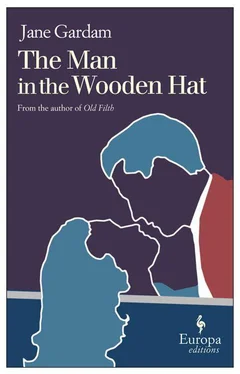“Someone else. I’d just met him.”
“Ye gods! Here, help me.” She was unloading the back of the car of the paraphernalia of the maternity run. “Met him here? In Hong Kong?”
“Yes. I think it was hypnosis.”
Weights, measures, bottles were heaped in Elisabeth’s arms.
“Rubbish, it was lust. It was natural desire. Or maybe it was only resentment,” said Amy.
“How do you know?”
“I know because you told me, yesterday, that your marriage frightened you, because it meant you would never know passion. You did it to have something to remember and to have known desire.”
“No, it was love. I’m not excusing myself. Edward will never know. It is love.”
“Elisabeth, what are you doing?”
“Is it so wrong to want a glorious memory?”
“It’s sentimental and obscene. You won’t like yourself for it in the end. You don’t like yourself now.”
“I never thought you were a puritan, Amy.”
“Well, you’ve learned something. I am.”
“After the way you went on at school.”
“That was ten years ago.”
“So you have been purified by Nick?”
Amy was rolling from side to side up the dirty stairwell, trying to support the unborn baby as it kicked to get clear of her ribcage and slide into the world. From above came the wailing of apparently inconsolable children and the voice of a roaring man.
A saffron monk stuck his head out of his doorway as they passed, his hairless shining face determinedly blissful. He asked if he could eat with them. “No,” said Amy. “There’s too much going on,” and the monk blissfully retired.
“Where in hell —” shouted Nick at their open door. “You’ve been hours. We’re going mad.”
Mrs. Baxter, in a rocking chair, held an unhappy bundle. “I’m afraid she’s wet again.” An untouched bottle of formula stood near, untouched, that is, except by flies. “It’s time to get Emily back from school.”
“Well, here’s the car keys,” said Amy, picking the baby out of Mrs. Baxter’s bony lap, dropping the nursing gear, scooping another child out of Nick’s struggling arms. “Oh, and can you give Bets a lift back to the Old Col?”
“Bets?” Nick took a hold, looked at her and switched on the polite. “So sorry. Don’t think we’ve met. Are you new here?”
“I’m passing through.”
“We were at school,” said Amy.
“Oh. Excellent . Sorry about the scenes of married bliss. Didn’t see you there, ha-ha. You’ll want to be off.”
“No. I don’t want to go.” She looked at Nick in his plastic dog collar. “Amy, I don’t know what to do.”
“Pray you’re not pregnant,” said Amy, also behaving as if the two of them were alone. “Try prayers. Go ahead with earlier plans.”
“Someone will tell him. You know they will. You know Hong Kong.”
“Oh, probably. If so, I suppose that’ll be it. But I wonder? He doesn’t sound the ordinary old blimp, your future husband.”
“What is all this?”
“It is something, Nick,” said Mrs. Baxter, “that I don’t think we should be listening to. You are making us eavesdroppers, Amy.”
“I’ve more to do than stand here dropping eaves,” said Nick. “I’m teaching a Moral Sciences seminar in twenty minutes.”
Amy and Elisabeth continued to stand in silence and it was (surprisingly) Amy who began to cry.
“You’re — oh, if you knew how I envy you, Bets! You’re so innocent . You’re going to be so ghastly soon. All this will be an uneasy memory when you’re opening bazaars around the Temple church in the Strand, and organising book groups for barristers’ wives. You’ll metamorphose into a perfect specimen of twentieth-century uxorial devotion. You’ll have this one guilty secret and you’ll never forgive me for knowing.”
“I don’t know what the hell’s going on,” said Nick.
“You and I, Bets, will be the last generation to take seriously the concept of matrimonial fidelity. Wait until this lot gets cracking with sex and sin in the — what? — in the sixties.”
“How do you know?” said Elisabeth.
“I know.”
“Are you happy about it, Amy?”
“I am bloody, bloody unhappy about it. Have a child at your peril, Bets. It will hurt you to hell.”
One of the children then began to cry for its dinner and slap, bang went Amy with the rice pot.
“Nick — take Betty now . Bets, see you at the altar? Right?”
Mrs. Baxter began to sing “When I survey the wondrous Cross” as she unwrapped the wet child, who at once spread out its wet legs and went thankfully to sleep.
At last there was a message for Elisabeth Macintosh when she returned to the Old Colony Hotel. She was called over to the reception desk and an official-looking letter was put into her hands. The envelope came from Edward’s London Chambers and it chilled her. Her name was typewritten. So, it was all over.
She took it upstairs — the bedroom still untouched, the two beds a mess, but she found a red light flashing by the telephone. Which first? Face the one you fear.
She opened the letter and inside, in Edward’s beautiful, clear script, read, I have wonderful news. Ross will bring you to the Old Repulse Bay Hotel tonight to celebrate it. I have not had a minute — literally, I mean it — to telephone or write. You will soon see why. I love and long for you, Edward .
She contemplated the message light for a while and then rang down to reception. While they dialled up the message, she sat with the blunt heavy block of the black receiver in her hand. At length, after much clicking, a voice, a recording from somewhere: This is Mr. Albert Ross, consulting solicitor to Mr. Edward Feathers QC. I am to call for a Miss Elisabeth Macintosh this evening to take her to dinner with Mr. Feathers and his team. The dress code will be formal. Six o’clock .
Who is this pompous ass? The famous Loss the Demon Dwarf? So, we shall meet. I’m not going to like him. I’m being played with by all of them. I’ve half a mind. .
And “dress code formal’! What in hell? I’ve no money and nothing clean and Edward must — should — know it. As if he did!
She went to the waste-paper basket and fished out the dress.
No. I couldn’t. I can never wear it again. It feels cold and wet. I can hardly bear to touch it. (But she held it to her face.)
I suppose I could get them to press it. Laundry service? But just touching it, looking at it, makes me want to cry. With happiness, private happiness, not with guilt. Once only. It is a sacred dress. And she pressed her face into it and remembered Veneering’s hands and skin and hair and sweat as the dress lay like a slop of spinach on the wood floor of the weird tree house. I will never wear it again.
Time? It’s still only two o’clock. I’ve over three hours. Food? Not hungry. Perhaps try. Get room service. Get a saté from a stall.
She turned in her cotton clothes into the poor streets again, stepping through litter and ordure. A man without legs sat, his crutches splayed, opening shellfish, the shells thrown about him. She bought a pork saté from a boy yelling “Saté” insolently in her ear. Then she bought a warm, soft prawn fritter and stood eating it all. It smelled sweet and good. Looking up above the street stalls she saw on a hoarding a huge photograph. It was a young European girl naked to the waist and smelling a rose. It was, undoubtedly, Lizzie.
Well, of course not. How could it be? Lizzie was an intellectual. She’d been at Bletchley Park. And she was, or said she was, a lesbian. One didn’t think about it. She was always coming and going to Hong Kong. She told you nothing. There were rumours of her having something to do with the Chief of Police. She had known some terrible people, even at school. But she’d been serious, hard-working. But naked to the waist and a rose! Smelling the rose! Lizzie! Well, she does say she’s broke. No, I’m just tired.
Читать дальше












